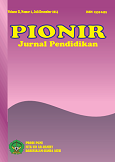EVALUASI PROGRAM PENDIDIKAN NON FORMAL PADA RUMOH BACA HASAN-SAVVAS DI KOTA LHOKSEUMAWE
DOI:
https://doi.org/10.22373/pjp.v10i2.10291Keywords:
Program Evaluation, Education, Non Formal, Rumoh Baca Hasan-Savvas.Abstract
This study aims to evaluate non-formal education programs at Rumoh Baca Hasan-Savvas in Kota Lhokseumawe because in general, the community reading park is difficult to find in Aceh. This study was conducted to find out how the evaluation of non-formal education program on Rumoh Baca Hasan-Savvas in the evaluation of Context, Input, Process, and Product?. The type of this research is qualitative evaluation research, with phenomenological approach of field study. The sample in this study was the head of the Rumoh Baca Hasan-Savvas institute, the person in charge of the program and the students who were taken at random. Data were collected by observation, interview and documentation. The data collected is analyzed by organizing the data, spelling it into units, synthesizing, arranging into patterns, choosing what is important and learning, and making conclusions. The results of this study indicate that in the evaluation of the context: the goal in eradicating illiteracy and marginalization and the context of the program has been implemented fairly well. In the input evaluation: the age level, the area of residence and the background of the learners vary according to the initial provision of the program, the staff education background on Rumoh Baca Hasan-Savvas 90% is S2, in general the teaching staff has experience in the field so as to provide good service to the participants though still short of teachers, donors who help the implementation of the program in Rumoh Baca Hasan-Savvas come from domestic and abroad but still still need other funding for the future. In Process Evaluation: student recruitment process, program management strategy, learning strategy has been done well enough, schedule of program implementation either literacy activity or creative class have been given to every learner but sometimes still hampered on availability of books for literacy activities as well as materials standard for the creation class, the person in charge of the program is appropriate because it is appointed directly by the head of the institution based on the mature consideration. In Product Evaluation: improved achievements and behavioral changes are increasingly for the better.References
Blain R Worthen dan James R. Sanders. 1973. Educational Evaluation: Theory and Practice. Worthington: Jones Publishing Company.
Djali dan Pudji Muljono, 2004. Pengukuran dalam Bidang Pendidikan. Jakarta: Program Pascasarjana UNJ.
Dokumentasi dari Rumoh Baca Hasan-Savvas.
Farida Yusuf Tayibnapis, 2008. Evaluasi Program dan Instrumen Evaluasi untuk Program Pendidikan dan Penelitian. Jakarta: Rineka Cipta.
George F Madaus, Michael S Sriven dan Daniel L Stufflebeam, 1983. Evaluation Models : Viewpoint on Educational and Human Services Educations. Boston: Kluwer-Nijhoff Publishing.
Ishak Abdulhak, Ugi Suprayogi, 2012. Penelitian Tindakan dalam Pendidiakan Nonformal. Jakarta: Raja Grafindo Pustaka.
Leonard Rutman, 1984. Evaluation Research Methods: A Basic Guide. London: Sage Publication.
M. Arief Rizka dan Wayan Tamba. Pemetaan Inovasi Program Pendidikan Non Formal pada Pusat Kegiatan Belajar Masyarakat (PKBM) di Kota Mataram, Jurnal Transformasi 1 (1): 1-10
Sofyan Hadi, 2014. Pengembangan Model Evaluasi Program Life Skills Pendidikan Luar Sekolah, Disertasi: Program Pascasarjana Universitas Negeri Yogyakarta.
Sugiyono. 2009. Memahami Penelitian Kualitatif. Bandung: Alfabeta.
Suharsimi Arikunto dan Cepi Safruddin Abdul Jabbar, 2009. Evaluasi Program Pendidikan: Pedoman Teoretis dan Praktis untuk Mahasiswa dan Praktisi Pendidikan. Jakarta: Bumi Aksara.
Downloads
Published
Issue
Section
License
- Authors retain copyright and grant the journal right of first publication with the work simultaneously licensed under a Creative Commons Attribution License that allows others to share the work with an acknowledgment of the work's authorship and initial publication in this journal.
- Authors are able to enter into separate, additional contractual arrangements for the non-exclusive distribution of the journal's published version of the work (e.g., post it to an institutional repository or publish it in a book), with an acknowledgment of its initial publication in this journal.
- Authors are permitted and encouraged to post their work online (e.g., in institutional repositories or on their website) prior to and during the submission process, as it can lead to productive exchanges, as well as earlier and greater citation of published work (See The Effect of Open Access).

